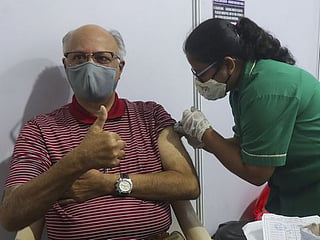How COVID-19 has left India’s education sector in tatters
Online education, pay cuts for teachers and broken routines have taken a toll on everyone

Thiruvananthapuram: In early March 2020, when Maria S. took a bus to her native Kottayam district from Bengaluru where she was in her second year of under-graduation at one of India’s prestigious colleges, she was elated by the unexpected holiday break presented by the lockdown.
More than a year later, she feels downright miserable: “My entire final year of college has been washed out, merely attending online classes. Placements are unlikely and my class does not even know when we will have the final exams and whether they will be online”, she says.
Maria is not alone in her angst at having lost what should have been an enjoyable and defining year of her life. Roughly 28 million students are enrolled in various under graduate programmes in India, who are all facing various degrees of uncertainty.
Add the school student numbers and you get the Himalayan proportion of youth and children of India who are the most scarred-for-life owing to the coronavirus-related disruptions.
A decade ago, India’s last census in 2011 had revealed that the nation had 315 million students, the largest student population in the world, and a number that nearly equals the entire population of the US. All those millions now stay at home, bewildered about what life holds for them.
Devices and disrupted lives
On paper, India has adopted the online option for education, but that is understating what actually happens with real learning.
Given the meagre resources of large numbers of Indian parents, many could not afford the devices that their children needed for education. Parents who had to go to work couldn’t share devices with children and many who had devices were victims of unreliable internet connections.
An early casualty was a Class 10 girl in Kerala’s Malappuram district who took her life in June 2020 because she could not attend online classes. The girl, who had neither a television nor smart phone at home, left a heart-breaking single-line note in her room, “I am going”.
Piano classes online
While financially strained families struggled to arrange devices for their children, even the well-heeled in other parts of India could feel the pain of their children losing out on wholesome education, consigned to homes in front of screens.
The classes are going on but the question is how much they actually learn.Maya, a parent.
Maya P, who has two children in classes 5 and 1 in Mahim, Mumbai, told Gulf News she is really worried whether so many months of online studies will affect the reading and writing skills of her children.
“The classes are going on but the question is how much they actually learn. There’s very little of reading or writing, and even the examinations are mainly in the MCQ (multiple-choice question) format, requiring the student only to tick a box or an answer.
“Children are merely little boxes on the teacher’s screen and how can any teacher devote personal attention to each of them?” asks Maya.
And then there are frills that schools in India’s cosmopolitan cities like Mumbai offer, like piano classes. But there is a catch – those classes too have shifted online and now students need to have their own piano at home.
Similarly, speech and drama classes in schools have also shifted online and fees are duly charged, with no assurance on the learning outcomes.
Broken routines
What has bothered parents – both employed and homemakers – over the past year has been the challenge of managing children not 24x7, but 24x365. “The whole family worked around the school and office routines. Now all are stuck at home. When they could go to school, they had a fixed routine and were kept engaged for about six hours. Now their online classes take only about one-and-a-half hours and the onus of keeping them engaged and entertained is on the family,” says Maya.
Parents who are working from home and also have to sit with their young children when they attend their online classes are in a Catch-22 situation. “I used to be strict about the children’s screen time. But now that they are at home all the time and if I get busy they exploit that,” says Maya. As for children, with their school timings shrunk to a third and no commuting or interaction with friends, screen is what they turn to for any kind of entertainment.
Unending chores
It has been equally tough for teachers, who have had to adapt to the online classroom, prepare fresh material to suit the changed teaching ecosystem, and endure virtually unending work hours to give online assignments, evaluate them online and handle telephonic queries from parents and students round the clock.
“I taught on the phone, struggled to get my young kids to be attentive on their devices, prepared my notes and teaching material, evaluated online assignments, handled parents’ queries and much more. Work stretched late into the night and began early morning. I hardly had time to breatheAnna, a school teacher in Kerala.
Anna T., a school teacher in Kerala’s Kottayam district who made her teaching debut in the lockdown year, personifies the pain working women with young children have borne during COVID-19.
Anna has three children aged seven, five and three, all of who had to be monitored while they attended online classes at different times of the day, even as she herself had to engage different classes. This, besides handling the kitchen and getting lunch ready for her businessman husband who would drop in briefly at mid-day amid his own busy schedule to keep the business going.
“I taught on the phone, struggled to get my young kids to be attentive on their devices, prepared my notes and teaching material, evaluated online assignments, handled parents’ queries and much more. Work stretched late into the night and began early morning. I hardly had time to breathe”, recollects Anna.
At the end of it all, her school, like numerous other educational institutions, slashed her pay cheque. That was the final straw. She put in her papers, ending a largely forgettable debut year.
Dashed college dreams
India’s median age is only 27 years, and the country has roughly 230 million in the 15-24 age group, statistics that would be the envy of any nation from the aspect of demographic dividend. But COVID-19 has dashed the dreams of India’s college students, some of who have not been fortunate even to step into their campuses.
For many university students, it is like living in the World War years. Incomplete education and uncertainty about jobs and their future.
We have hardly anything to remember of our college days; no farewell, only a limited interaction with our seniors, and barely any placements.Anamika S., a college student in Kerala.
When Anamika S. went to college in Kochi for B.Com in 2018, she had heady dreams of life on campus and a bright career thereafter. The floods of 2018 in Kerala curtailed a lot of her classes in the first year and the third year was a total washout owing to the lockdown.
“We have hardly anything to remember of our college days; no farewell, only a limited interaction with our seniors, and barely any placements. I was in the college dance team and the kabaddi team but inter-collegiate competitions weren’t held”, rues Anamika.
PG and piano alike – online
Paying for online piano classes is bad enough, so think of paying a couple of million rupees for post graduate education and sitting at home attending online classes.
Anamika went through national entrance tests to secure a seat for post-graduation in a leading Bengaluru college, but she has already been told that until July classes will be online. “Seems like my next innings will also be in front of a laptop,” Anamika says with a sense of resignation at the helpless turn of events.
Anamika is not alone. George M. who is pursuing MBA at a leading Bengaluru college spent nearly his entire first year at home, attending online classes. When classes finally began towards the end of the first year, there was a fresh outbreak of the virus and college was shut again after hurriedly-held exams.
“We could barely meet our seniors who had to leave without a proper farewell, a college-day celebration and very few getting placed. We may be in for a similar experience”, fears George.
What is bugging George and his classmates is the lingering uncertainty, and its fallout. “When classes finally began, many of our good teachers quit because they didn’t want to risk contacting the virus from live classrooms. That meant the remaining teachers engaging more subjects, which meant a tangible dip in quality”, says George.
Financially challenged
Just as students have been deprived of a complete education, so have their parents’ livelihoods been battered by intermittent shutdowns, lockdowns and curfews by ever-changing rules imposed by India’s federal and provincial governments.
“Financial problems have hit many parents, leading to non-payment of school fees. There were several parents who could not pay the final-term fees of 2019-20 because India’s financial slowdown was biting even before COVID-19 struck. The arrears were just brought forward into the next academic year in June 2020, and it seems like the arrears will balloon further if and when school opens in June 2021,” says Peter V., a Kottayam-based businessman.
In the school where three of Peter’s children study, the year-end results put students in two categories – ‘P’ and ‘W’. ‘P’ for passed, and ‘W’ for ‘result withheld, meet the principal’, which is another way of saying your ward’s fee remains unpaid.
Long struggle ahead
Despite their own struggles, many parents can understand the predicament of schools. As more students join the ranks of fee defaulters, schools are resorting to major salary cuts for teachers and other staff, and laying off support staff like ayahs (maids), drivers, cleaners, gardeners and security staff.
Amid the gloom, some try to shovel up positive thoughts. Says Anamika: “If there is one gain from this dark patch in life, it is the fact that I got to spend a lot of time with my dad, a busy advertising and public relations professional who used to spend precious little time with the family”.
Bengaluru-based George can also find one silver lining in his highly truncated post-graduate programme: “MBA is meant to prepare you for life. By having to go through the course in these times, life gives you a big practical lesson in handling setbacks.”
Anamika, George and millions of their young contemporaries across India would, however, want to see not just a silver lining, but the skies to clear.
Sign up for the Daily Briefing
Get the latest news and updates straight to your inbox









